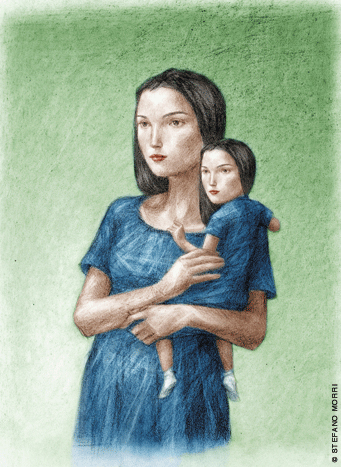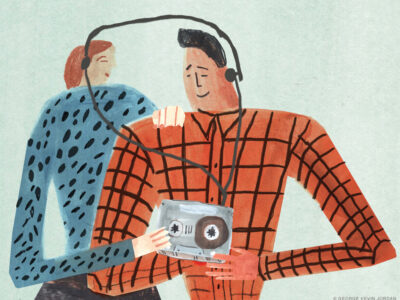
The psychology of cloning.
By Stephen Levick
Eleven years ago, at what now seems the dawn of a new age of bioscience, the world said an anxious and ambivalent hello to a most unusual sheep—a cloned one. “Dolly” was conceived in a way no mammal had ever been before—by transferring a cell nucleus from an adult animal into an egg whose own nucleus had been removed. The prospect of human cloning suddenly became impossible to ignore.
In the first decade of the 21st century, human replicas remain the stuff of science fiction. In mammals, reproductive cloning currently poses significant risks for mother and baby alike. For that reason alone, the scientific consensus is currently against trying it in humans.
Yet as biologists make further advances in this area, we may eventually face a future in which the medical risks of cloning become no greater than other forms of assisted reproduction that now enjoy broad acceptance, like in vitro fertilization (IVF). Should that come to pass, some scientists or businessmen may well see the technical accomplishment as a green light, and press ahead without pause.
This would be a dangerous mistake. If we focus narrowly on medical safety, we overlook a question with profound implications for the health of our children and our society. In short: What psychological risks might await a child who is the genetic replica of a pre-existing person?
Although it is impossible to put this question to any empirical test, a series of thought experiments yields some unsettling results.
In one sense, of course, human clones have been with us for eons. After all, identical twins bear matching genomes. At first glance the situation of an identical twin would seem to be the only analogue available to help us anticipate the kinds of challenges a clone of an already existing person might face.
Generally born within minutes of one another, identical twins are also typically reared under the same roof. We expect them to highly resemble one another, and they usually do. Large epidemiological studies show little or no effect of twin status on mental health—a fact often cited by those who limit their understanding of a prospective clone’s situation to genetics alone.
But the example of identical twins has a severe limitation. Twins might share the same genome, but it is a new genome. They are clones of one another, not of a person who has already lived a portion, or even all, of his or her life.
This would change things dramatically. The clone’s rearing parents would almost surely know the progenitor’s history, perhaps intimately. Consciously or not, they would expect a cloned child to strongly resemble his or her progenitor, and in highly specific ways. The surprises and mysteries of that child’s strivings and accomplishments would be measured against each parent’s mental template of the child’s progenitor.
Highly specific parental expectations can be overwhelming for a child struggling to exert his autonomy and evolve his or her own personal identity. The burden of such expectations is likely to be especially heavy for the child clone.
For a child cloned from one of his rearing parents, the situation would be even more intense. No sexually reproduced child could approach the degree of self-resemblance that such a parent might expect, and even demand, from a self-clone. Such a parent would surely feel entitled to know and be involved in every detail of the child’s life. Furthermore, the very fact that a given individual chose to self-clone might in itself indicate a risk for this potentially harmful parenting predilection.
Yet even for parents who aren’t pathologically narcissistic, dangers abound. For example, some individuals might be motivated to self-clone by the belief that doing so would guarantee enhanced empathy for the child, and vice versa. But no matter how pure the intention, “imposed empathy” is an odious oxymoron. Such a parent’s notion of empathy, both for and from a child self-clone, would undoubtedly be detrimental to the child.
Others might be motivated to “replace” a dead loved one via nuclear transfer. But history is rich with examples in which the bereaved, unable to bear their loss, want a new baby to fill the void. When the resulting child is treated as a replacement, the new one is fated to be compared unfavorably to the air-brushed memories of that child’s beloved predecessor. It is not surprising that replacement children tend to feel insecure, inadequate, angry, and guilty.
At bottom, all these scenarios stem from an unavoidable fact. A clone by nuclear transfer would have one and only one progenitor. Consequently, he or she would be linked genetically to at most one rearing parent. In that sense, a clone might have much in common with a stepchild. If so, we must not ignore the fact that being a stepchild is the single biggest risk factor for becoming a victim of child abuse. Or that the presence of a stepchild in the family appears to increase the likelihood that divorce will break it apart.
The prospect of human reproductive cloning puts our most fundamental psychological assumptions and ideas in a new and alien frame. But our current knowledge of child and adolescent psychology provides a rich basis for shedding light on the unique challenges a clone would likely face—illuminating just how complex and forbidding such a life might be.
Throughout the evolution of our species, the sexual nature of human reproduction has been a given—even in the absence of sexual intercourse, as in IVF. Every individual inherits a combination of genes from two others. This may well be the ultimate biological mechanism underpinning just the right amount of parental investment in our offspring—usually neither too little nor too much. It may also be the most fundamental basis for the social nexus on which human society rests. Beyond any biological risks posed by nuclear transfer, a clone’s asexual origin may well have profoundly damaging emotional consequences. Any society that might consider embracing a “medically safe” form of human reproductive cloning had best think again.
Stephen E. Levick, M.D. is assistant clinical professor of psychiatry at the School of Medicine. He is the author of Clone Being: Exploring the Psychological and Social Dimensions(Rowman and Littlefield, 2004).




